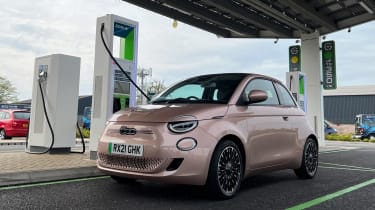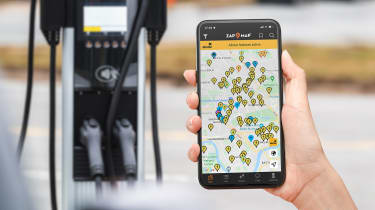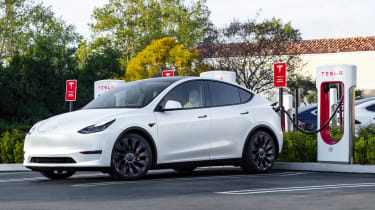Electric car charging stations: public networks, charger types, apps and maps
Thinking of switching to an EV? Here’s everything you need to know about electric car charging stations

Electric car charging stations are now more common than ever, as more drivers make the switch from combustion cars to electric vehicles (EVs). EVs are now the second most popular car type in the UK according to the Society of Motor Manufacturers and Traders (SMMT), and the UK’s charging network will only expand further as we gear up for the 2035 ban on petrol and diesel cars.
However, some confusion remains around the UK’s electric car charging infrastructure. Charging times and costs vary, while there are different charger types and network operators to be aware of. Charging stations are still not as commonplace as traditional fuel stations, so tools exist to help you find your nearest one.
 Tesla Supercharger network explained
Tesla Supercharger network explained
Our guide sets out what you need to know about electric car charging stations clearly and with as little jargon as possible. While it’s aimed primarily for drivers of electric cars (EVs), the information contained here will be of use to those after a plug-in hybrid (PHEV), too.
What is an electric car charging station?
A ‘charging station’ is simply a public location for charging an electric car. It applies to everything from a single charger in a supermarket car park, to a purpose-built charging forecourt – much like a traditional petrol station, but with eight or more chargers.

Large charging forecourts will usually be found along motorways or busy A roads. They are run by companies such as Shell or Instavolt and provide multiple chargers, usually under a large canopy. Gridserve has even designed its forecourts to provide things for EV owners to do while their car charges, with coffee shops, retail stores and even office pods for work or meetings.
At the other end of the spectrum, you can find individual chargers in many locations in urban areas. Supermarkets will often provide one or more EV chargers in dedicated parking bays, while some local authorities have installed roadside chargers within lamp-posts and bollards, although these tend to charge more slowly than the forecourt rapid-chargers mentioned above.
Electric car chargepoints are operated by different providers, much like how BP, Shell and Texaco run their own petrol stations. For example, Tesla’s Supercharger network is one of the most popular, while PodPoint and Ionity are expanding their networks. Our EV drivers survey has ranked the best electric car charging networks in the UK.
How many electric car charging stations are there?
As of June 2024, there are nearly 65,000 public electric car charge points in the UK, distributed across almost 34,000 locations. While the majority of these locations comprise only a handful of chargers – in a petrol station or supermarket car park, for example – there are now more charging forecourts, too. Importantly, the number of rapid charging stations is increasing, although the majority of UK public chargers are still categorised as ‘slow’ (under 7kW).
While 34,000 charging locations may seem impressive compared with the 8,000 petrol stations in the UK, most petrol stations have more pumps than the average electric car charging station has charge points. However, it’s worth noting that most electric car owners charge their vehicles at home the majority of the time. According to research, the average UK driver covers just 20 miles a day, amounting to 7,400 miles per year. Public charging stations are typically only used on longer journeys, therefore.
Where can I find an electric car charging station?
Finding an electric car charging station is fairly straightforward, and you can do it at home or on the road. ZapMap is a handy website that provides an interactive map of the UK’s EV charging stations, with filters for different charger types and speeds. It is also available as an app.

Most modern electric cars have an EV charging station finder built into the infotainment system. Many models will even integrate charging stops into your sat-nav route if you don’t have enough charge to reach your destination.
If your car doesn’t have this functionality, smartphone apps such as Wattsup and A Better Route Planner (ABRP) car provide routing, plus information on charger availability and pricing. Peugeot, Citroen, Jeep and other EVs from Stellantis can access a similar service through the e-Routes app. These apps can also run through Apple CarPlay and Android Auto with a subscription.
How long does it take to charge an electric car at a charging station?
EV charging times can vary widely depending on the car and the charger. The length of time an EV’s batteries take to recharge is determined by the size of the battery, how many kilowatts (kW) the charging station can provide and how many the car can accept – the higher the wattage, the faster the charge. While we have a full explainer article on EV charging, here’s a summary of the main four charging rates:
Slow charging – under 7kW
If you plug your EV into a regular three-pin outlet at home, it will charge at a maximum speed of between 2 and 3kW. While this is perhaps the most straightforward way to top up your car, it’s also the slowest, with the biggest-battery EVs taking up to 48 hours to reach full charge at these speeds.
Fast charging – 7-22kW
Fast charging points provide AC (alternating current) power at speeds of between 7-22kW. The majority of on-street public charging stations offer a rate of around 7kW, and you can also have a fast charge wallbox installed at home. If you find a spot with three-phase electricity, this can ramp up the rate to 11 or even 22kW, which can dramatically reduce charge times – providing your car can accept this speed of AC charge. Select cars may even take an AC rate of 43kW, but this is very rare.
Rapid charging – 50-100kW
While rapid charging was uncommon a few years ago, virtually every new electric car is compatible with it today, and there are a growing number of charge points popping up across the UK. This method uses DC (direct current) and is far faster than the methods listed above.
Rapid chargers use a tethered cable, so you won’t need to bring your own. They typically use a Combined Charging System (CCS) connector, which allows for much faster speeds. When charging at 50kW, drivers can expect a full charge in anything between 30 minutes to an hour.
Ultra-rapid charging – 100kW+
Once exclusive to Teslas and other high-end electric vehicles, ultra rapid charging has surged in popularity in recent years, with even some of the cheapest electric cars getting access to 100kW+ charging. At this rate, drivers can expect a full charge in anything between 20-40 minutes. While there are even some 350kW chargers out there that will deliver over 200 miles of range in just 10 minutes, there are very few available and even fewer EV models that can make full use of them.
How much does it cost to charge an electric car at a public chargepoint?
While many EV drivers are enticed by the low costs of charging at home, using a public charger is often far more expensive. In fact, the cost of exclusively using public chargers is likely to be similar to the cost of running a petrol car.
According to ZapMap, the average cost of using a rapid or ultra-rapid charger is 80p per kWh as of June 2024. If you were to fully charge a 70kWh battery at that price, it would cost you £56. Public slow and fast chargers are cheaper, at an average cost of 57p per kWh, but it remains an expensive alternative to charging at home.
If you intend to go on longer journeys and use charging stations frequently, there are ways to cut your costs. Many chargepoint providers offer subscription services with which you pay a small fee every month in order to get access to reduced charging rates. Several manufacturers such as Audi have also partnered with providers to offer exclusive low rates for owners of their cars.

Then there’s Tesla, which owns an impressive network of charge points called Superchargers that are dotted across the UK in large numbers. While owners of early models are able to access these for free, most Tesla drivers will have to pay to use them. Again, subscription services can lower this price, and could make Supercharger fees cheaper than those offered by competitors.
Tesla’s latest V4 Superchargers, introduced in 2023, are now open for drivers of non-Teslas to use. However, Tesla operates a two-tier pricing system, with non-Tesla drivers paying roughly 10p more per kWh.
Charging etiquette
It’s important to understand the correct connectors and charge rates for electric vehicles, but it’s also a good idea to know the informal conventions that surround charging at public stations. The broadly accepted rules are as follows…
Don’t hog a charging bay
Once the batteries are nearly charged (or charged to 80%, an amount some consider ideal), it’s best to unplug your car and carry on with your journey. Don’t use the bay as a parking space once your EV is charged – there will more than likely be someone queueing to use the charger after you.
This has a practical aspect as well, as several manufacturers such as Ford and Volkswagen suggest that for day-to-day driving, you should only charge your car to 80-90% to help preserve the life of its battery. Charging also tends to slow down significantly above 80% to avoid heating the battery too much and causing excessive wear and tear.
If the charger is occupied, make a note of any other drivers who might be waiting
One of the most important unwritten rules of public charging is to make sure that any EV driver who arrives before you is given first refusal when a charge point becomes available. It’s often difficult to know who is waiting to charge, so if in doubt, ask, or signal your intent before plugging in. The last thing you want is a heated argument with someone who thought they were ahead of you in the queue.
Don’t unplug someone else’s car
If you’re at a motorway service station and encounter an EV that’s been left in a charging bay for a long time, ask if staff can make a tannoy announcement, encouraging the car’s owner to move. Some consider it okay to unplug a car that’s finished charging, but this isn’t always easy to tell and may not be met with kindness. If you must do it, leave a note on the owner’s windscreen, explaining why. Bear in mind some connectors don’t allow you to unplug them when the car is locked.
Report any damage to charging stations to the network operator
The supplier’s phone number will be on the charging point, and reporting any faults should ensure the connectors are fixed in a timely manner.
Offer to help
If you spot someone who’s having difficulty with their car or charger, ask if you can be of assistance. Charging stations have become a lot more reliable over recent years, but problems still crop up from time to time.
Stow the charging cable neatly when you’re finished
A loose cable can pose a trip hazard or be run over and damaged, so make sure you return it to the unit and don’t leave it trailing on the floor.
Looking to make the step into the world of electric motoring? Check out our list of the top 10 best electric cars...
More electric car advice
- What is an electric car?
- Electric car battery life explained
- How to charge an electric car
- Plug-in car grant
- How to buy a used electric car
- How to find EV charging stations
- Fast charging or rapid charging?
- Are electric cars green?
- What is range anxiety?
- Are electric cars cheaper to run?
- How much do electric cars cost?
- Tesla Superchargers explained
- What is a heat pump?
- How to charge an EV without a driveway
Recommended

New Subaru Trailseeker revealed as rugged electric SUV with 375bhp

New Subaru Solterra brings more range, power and polish
Most Popular
Tips & advice

Car dashboard warning lights: what does each symbol mean?

Electric car charging stations: public networks, charger types, apps and maps








